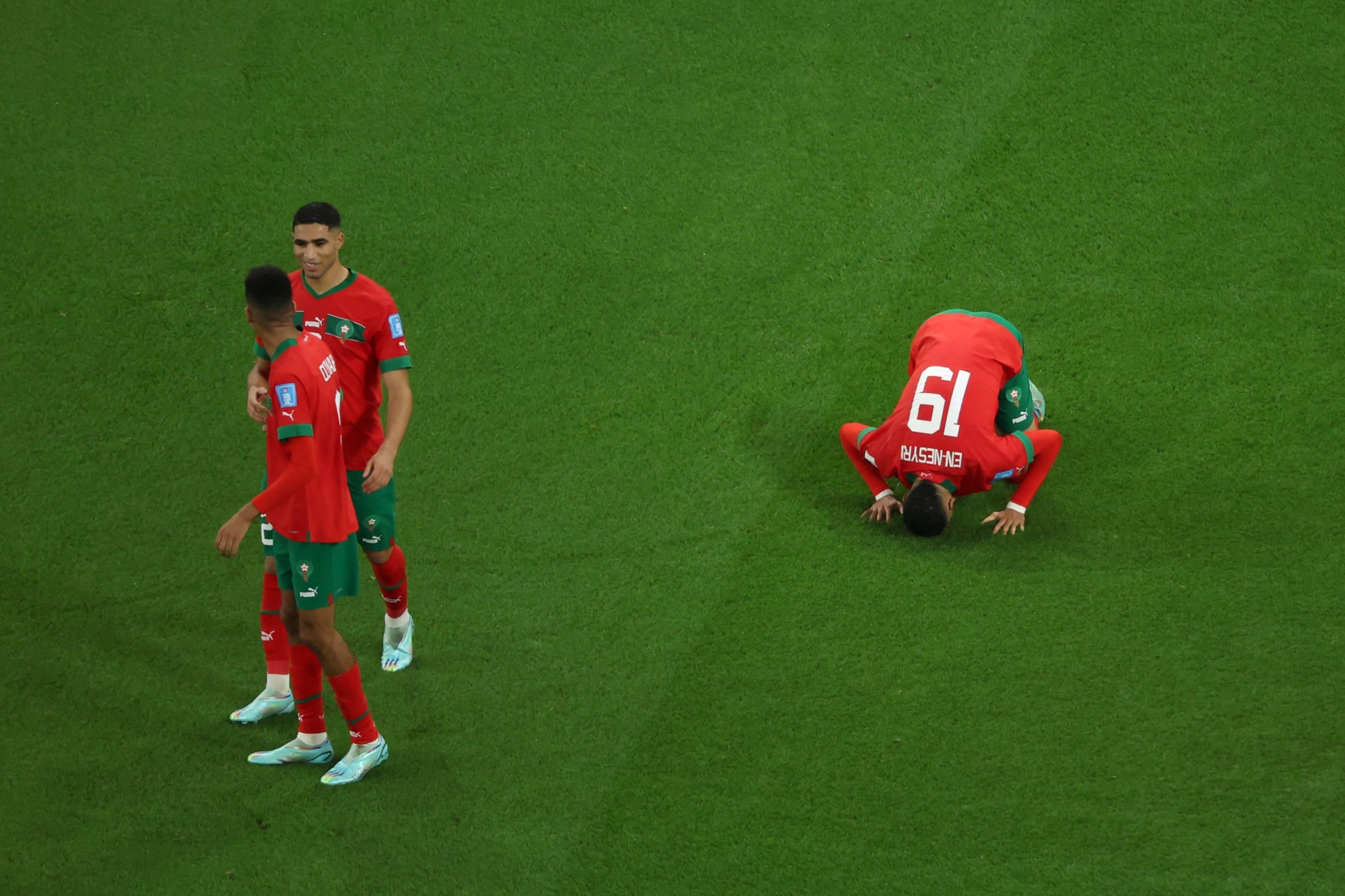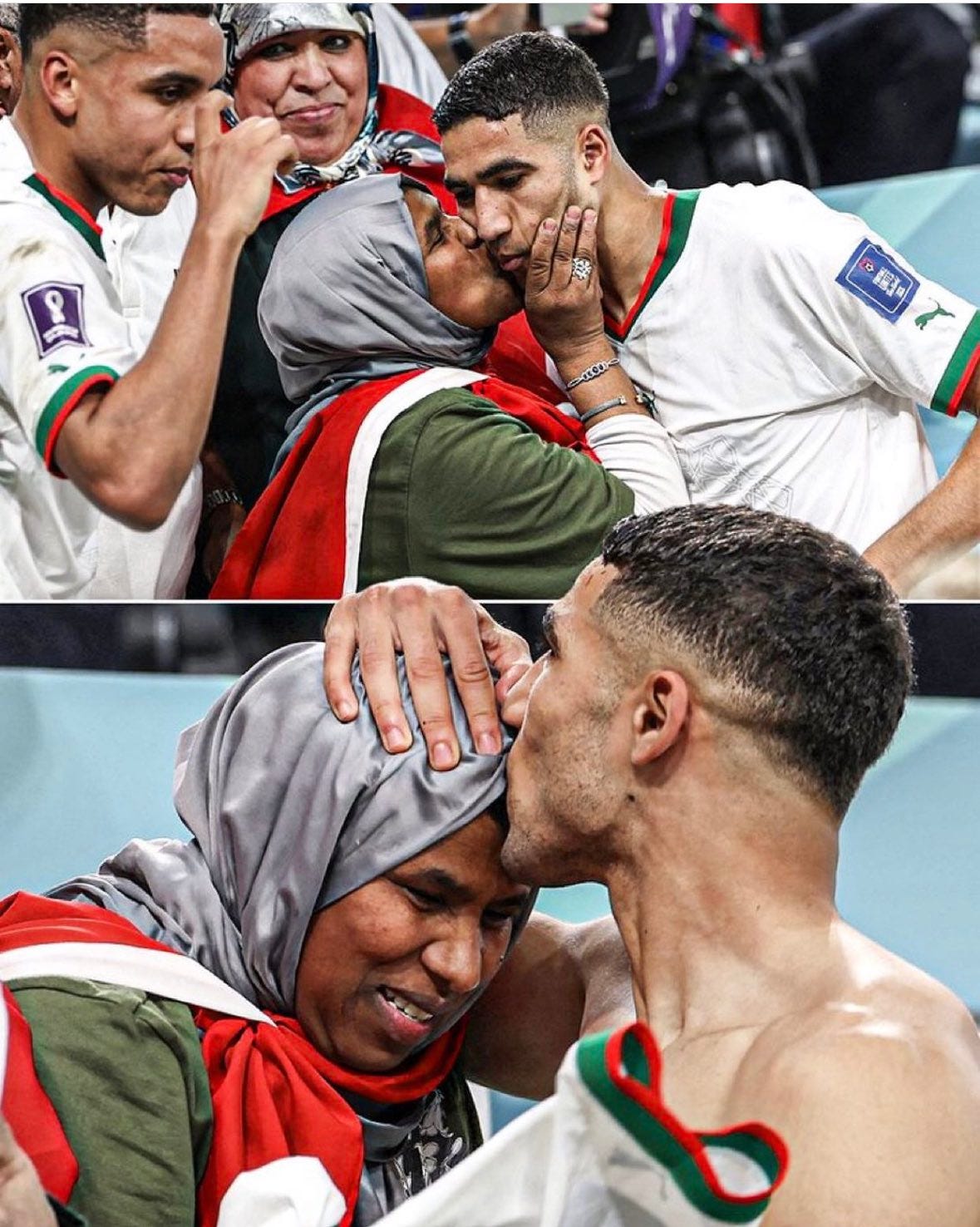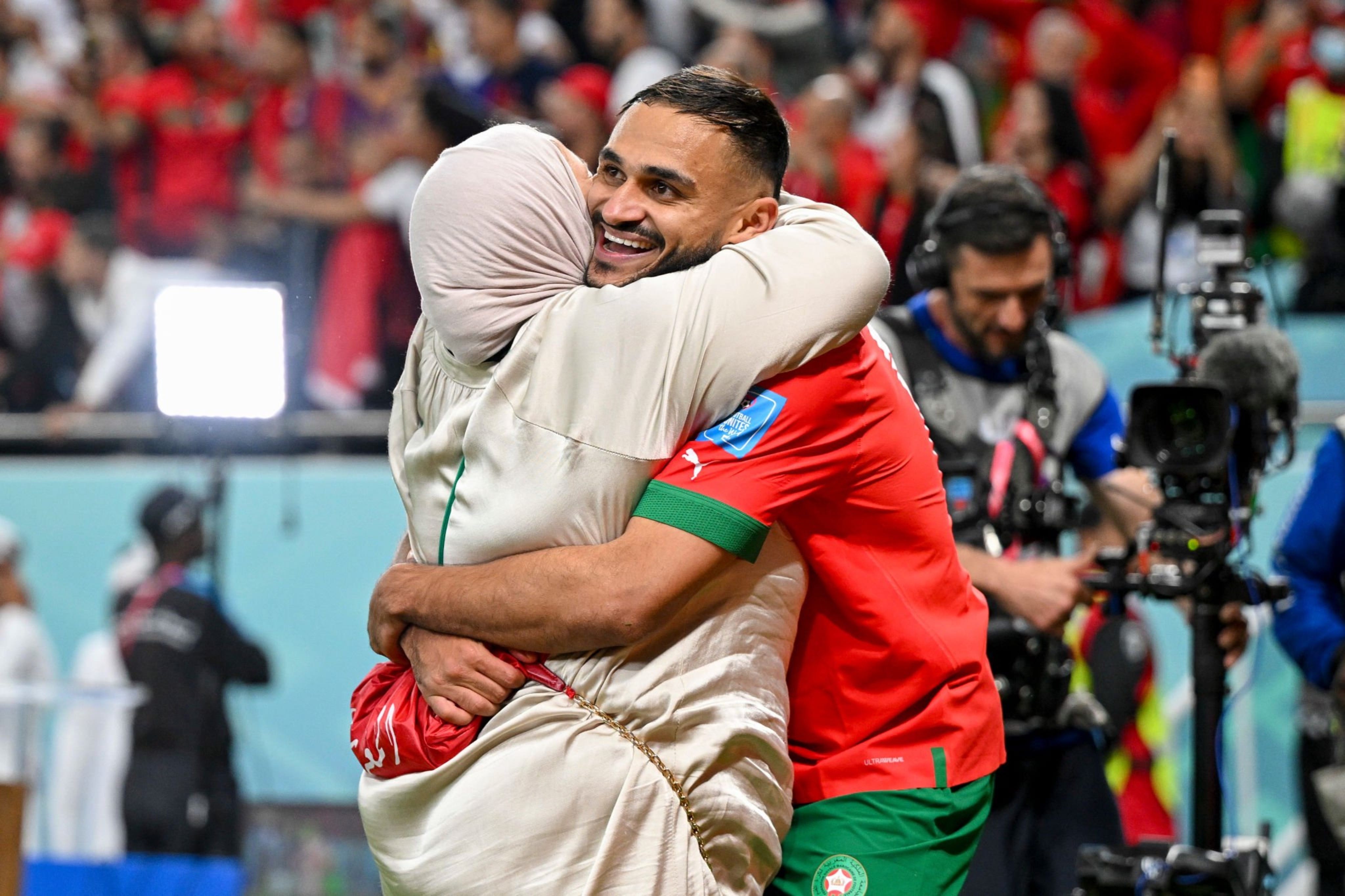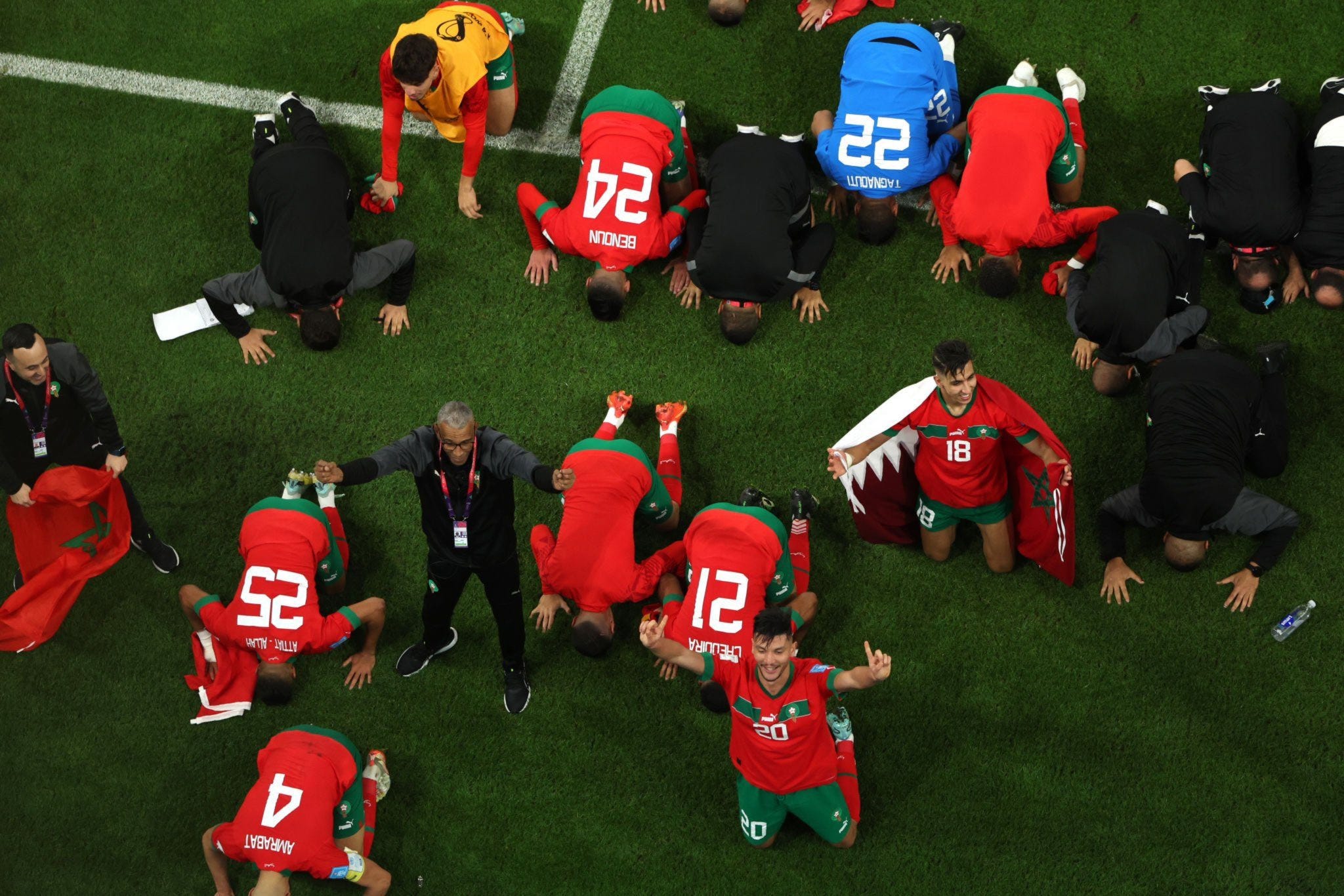Alhamdulilah for the Morocco National Team
The Muslim world have come to support Morocco in their masses often putting the Atlas Lions above their own nation. A lifetime of lived experiences explains why.
In my heart I feel a sense of, I don’t really know how to describe it, but let me try.
I feel this sense that I’m home, deep in my heart or my soul. It feels peaceful, it feels concluding in nature. You know when you clasp your two hands together (try it now), and they just sit perfectly neat, quiet, warm, equally firm and gentle. It is like the same sense of safeness and return as sitting in your parents’ living room. It also feels almost empty, like nothingness but in a good way.
I get all of those feelings partly when I do all of the things just mentioned but also when I visit the mosque, or when I pray. I’m Muslim.
The feeling probably peaks when the mosque is busy enough to feel connected to my brothers from every continent but not so busy that I’m in my own head about if I’ll find a space in the congregational prayer. Honestly, that’s a genuine struggle.
Trying to identify the source of that feeling is an unusual thing. The individual parts of that list seem sort of all over the place but after deliberation, I feel they are all predicated on a core idea of safeness which I think extends from feeling accepted. That acceptance again, I feel is born out of feeling as comfortable as I can, in my identity, for all it encompasses, in that present moment.
The feeling I am describing is whatever feeling lives at the intersection between mindfulness (being present) and acceptance. Remember this feeling. I will refer to it a lot.
I know my line of thinking here might lose some people. That’s fine.
Domestically, I have supported the club I was born into supporting, felt an alignment in identity to said club, and been unwavering in support ever since. Internationally though, that feeling is one I have felt most strongly this competition supporting someone like Morocco. I have supported England too and have hoped they do well but to a lesser extent than the Muslim-dominant footballing nations. That too comes down to personal identity.
For England’s national side, this recent cohort are players are incredibly easy to support. I like them. Most of them are talented, charismatic and funny but it is players like Marcus Rashford and Raheem Sterling that I truly want to do well. Rashford went to the secondary school that housed the football training sessions I attended throughout university. It’s in an area I’ve walked often with friends. He boasts an outward expression of morals and lived experiences that make him relatable to someone like me. Raheem Sterling speaks in words people I know use, whilst getting his football education playing street football, in an expressive, prodding style that again, I recognise. He’s spoken out on societal injustice and discrimination he, like most ethnic minorities, have faced.
As a collective, it’s a group that better reflects what I know of my English experience and where I feel I fit in than past England sides. There’s lots more that I can go into about Englishness and identity. That’s not a topic to completely explore today, but there will be people who were born in England and have lived here for as many years as I have who will feel more English than me and by nature, be far more passionate supporters of the national team. That’s completely fair.
If you’re one of those people and don’t understand my position here, I understand and I can’t describe a life of lived experiences that have fed into why that is, although I can half-try throughout this piece. Regardless there will be a generation of people with heritage planted in other countries who instead place religious or cultural identity above nation in international support.
There is a strong national element to Morocco’s success, without a doubt, but it is the binding thread of religion that too glows through this Moroccan national team.
Social media has been flooded with these photos of joyous reunions between Morocco’s son and their mothers, a lifelong bond expressed in hugs, kisses and dance.
The World Cup sits in the eyeline of billions and seeing mothers, in their hijabs, arm in arm with their children — heroes of the continent, expressing the same pride they’d express when their children would achieve a good grade in school is completely new and in the best of ways. The mothers of Morocco look like women I’d call aunty before being insisted to stay and eat whatever family meal was being cooked at the time.
When Boufal celebrates with his mother after the game, that’s aunty celebrating.
Those families, unashamed of their heritage, unashamed of their religious dress, stand on a stage we’ve never seen us before, saying words of Islamic tradition we’ve never heard elite footballers say, never mind at the level of the World Cup knockouts.
Prior to the penalty shootout against Spain, a footballing nation famed for their technical mastery of the football above any other nation, the Moroccan’s huddled together and recited Surah al-Fatiha, the first chapter of the Quran. It is a short chapter that every Muslim recites as part of their five daily prayers and so is an action that is entirely universal for the Muslim world.
Within the chapter the Muslims ask Allah (God) for help and guidance.
At 17 seconds of this clip, Abdelhamid Sabiri recalls the moment:
‘When we said (Surah al-)Fatiha bro, before the penalty, (it) was the best feeling in my whole life.’
The best feeling of your life being the moment before a high-stress World Cup penalty shootout, it’s a beautiful almost unbelievable thing but I’m fairly certain that - that feeling Sabiri reflects on is the same ethereal feeling I attempted to describe in the opening to this piece.
For the immigrants of the world, identity is a mosaic. It is easy to feel stranded at sea with few, if any points of references to latch onto. Sometimes you find your place in sub-communities made up of your fellow nationals within your new city. The Moroccans of West London are a perfect example of that.
Otherwise creating sub-communities within the city bound by a shared belief system, rather than nationality or race are our own mini-nations that we live in. Seeing the Moroccan side, with their clothing, in their mannerisms, in their language, in the profession for the religion, in all their actions — and having all of those things line up with what these sub-nations we invent for ourselves do too, explains why there is such a grand innate affinity for Morocco from people others may expect to support, say, England.
There’s a vast array of things that bind us all as humans but the English players weren’t told the same (Islamic) stories we were taught as children. The England national team had different cultural ideas about family and their roles within that family ingrained into them as they grew up too. The English players eat different food, dress in different clothes, and congregate in different societal spaces. That’s not to say those things are better or worse, they’re just less relatable.
The pub is more of a home for the English fans during the World Cup that (I assume) brings about that feeling of acceptance whilst being present. There is familiarity of faces, there is joy (or sadness) but a common goal and thing to believe in. There is a routine to it. I can be me here, I enjoy it, I’m surrounded by similar people for similar reasons and can relate to them, unashamedly. The Muslim fan gets that experience elsewhere.
For the Muslim footballing fan, football has been a stage upon which everything we have seen has been outside of that feeling. It is not entirely difficult to want well for a player you admire, irrespective of if they match up to all of the parts that make up your own identity. Often a skilful entertainer is enough to have you buy into his success but the ceiling of support is raised when that player shares parallels to your own story. You relate more to a member of your family than a distant friend.
After I have knelt in prostration and placed my head on the ground facing the qibla (the direction of the the sacred building at Mecca that all Muslims turn towards at prayer) I too, like the Moroccans raise my hands and call to Allah (God). I feel the same doubts followed by this familiar reassurance.
Above all, I know both those players and I feel that same feeling, of belonging, safeness, homeliness — the intersection between mindfulness and acceptance when we express our faith. That feeling wraps around you when you are expressing your religion in a connected way, within a community that understands you. It’s not a lonely feeling. Most within that sub-nation will have that sense of tranquility in their heart they can all relate to.
That feeling pulls me towards a side like Morocco in a way that is not conscious or premeditated. I relate to it beyond the level of skin colour or national identity.
‘During the past seven days of this holy pilgrimage, while undergoing the rituals of the hajj [pilgrimage], I have eaten from the same plate, drank from the same glass, slept on the same bed or rug, while praying to the same God—not only with some of this earth's most powerful kings, cabinet members, potentates and other forms of political and religious rulers —but also with fellow‐Muslims whose skin was the whitest of white, whose eyes were the bluest of blue, and whose hair was the blondest of blond—yet it was the first time in my life that I didn't see them as 'white' men.’
(Malcolm X reflects following his visit to Mecca on pilgrimage)
Islam, for so many Muslims, sits above national or racial identity because it gets rid of it altogether. Malik El-Shabazz (Malcolm X) felt that after his visit to Mecca, going so far as to rethink so many of his previously held ‘truths’ about race and nations.
Football, as a vessel for society to express itself through, now has millions of Muslims experiencing that same prioritisation with regards to their identity parts. The English-born Muslim, who has grown up in English society and may very well appreciate many of their experiences within the country, can still hold their faith above all else to the point it is expressed in football support.
It’s difficult to capture a lifetime of identity battles in a short written piece and have the piece be accessible universally. In spite of this, I pray some light has been shed as to why large parts of the Muslim world have gravitated to Morocco’s national side so strongly.
I’ll follow that prayer too with one last one that echoes the prayers of the many whose stories I’ve spoken on here — that this nation of sub-nations, bigger than its physical borders, has a miracle or two left in them. Ameen.






